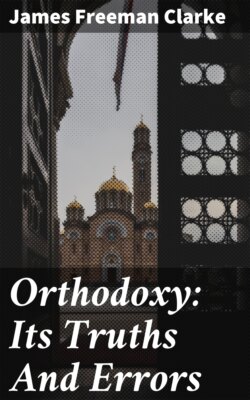Читать книгу Orthodoxy: Its Truths And Errors - James Freeman Clarke - Страница 9
На сайте Литреса книга снята с продажи.
§ 6. Fallacy in this Orthodox Argument.
ОглавлениеTable of Contents
The fallacy in all this argument lies here—that faith is confounded with belief; knowledge with opinion; the sight of truth with its intellectual statement in the form of doctrine. Undoubtedly there is only one faith, but there may be many ways of stating it in the form of opinion. Moreover, no man, no church, no age, sees the whole of truth. Truth is multilateral, but men's minds are unilateral. They are mirrors which reflect, and that imperfectly, the side of the object which is towards them. Therefore even knowledge in any finite mind is partial, consequently imperfect; and consequently needs other knowledge to complete it.
This, apparently, is what the apostle Paul means (1 Cor. 13:8–12) in his statement concerning the relation between knowledge and love. Knowledge (Gnosis) “shall pass away.” The word here used is elsewhere translated by “destroyed,” “brought to nought,” “abolished,” “made of none effect.” “Knowledge” here probably refers to definite and systematic statements of real insights. It is something more than opinion, but something less than faith. Faith abides, but knowledge passes away. Faith abides, because it is a positive sight of truth. It is an experience of the soul, by which it opens itself in trust, and becomes receptive of spiritual influence. Faith, therefore, remains, and its results are permanent in the soul. They make the substance of our knowledge as regards the spiritual world. This substance [pg 024] becomes a part of the soul itself, and constitutes a basis of self-consciousness as real as is its experience of the external world. But Gnosis is this faith, translated by the intellect into systematic form. Such systems embody real experience, and are necessary for mental and moral progress. They are the bodies of thought. But all bodies must die, sooner or later; and so all systems of knowledge must pass away. The body, at first, helps the growth of thought, helps the growth of the soul; but afterwards it hinders it. The new wine must be put into new bottles. Therefore the apostle Paul, the great teacher of doctrinal theology in the Christian Church, distinctly recognizes here, that every system of doctrine, no matter how much truth it contains, is partial, and therefore transient. He makes no exception in favor even of inspired statements—he does not except his own. All bodies must die; all forms are fugitive; nothing continues but the substance of knowledge, which is faith; the inward sight of God's goodness producing that endless expectation which is called hope; and the large spiritual communion with God and his creatures, here called Agape, or love. The apostle speaks in the first person when he says that knowledge passes away—“We know in part, and we prophesy [or teach] in part.” He speaks for himself and his fellow-apostles.
We see, therefore, that the great master and head of Orthodoxy in the Church has himself declared every form of Orthodoxy to be transient.
We conclude, therefore, that the apostle Paul, in this famous passage, overturns the whole principle of verbal Orthodoxy. He takes away its foundation. Not denying the reality and permanence of religious experience, not denying the saving power of truth, he declares that no expressed system of truth is permanent. The basis of doctrinal Orthodoxy is the assumption that its own particular form of belief is essential to salvation. But the apostle declares that all forms are transient, and, therefore, none essential. All [pg 025] statement is a limitation, and the moment that we make a definition, we say something which is incomplete. When Paul says, “We know in part,” he says the same thing which is said by Kant, by Sir William Hamilton, by Auguste Comte, by Mr. Mansell, and most modern thinkers, when they declare the relativity of knowledge. All thinking is limitation. “To think,” says Sir William Hamilton, “is to condition.” We only know a thing, says this school, by its being different from something else. The school of Kant declares all knowledge to be phenomenal, and that all phenomenal knowledge consists of two parts—the part given by the thing, and the part added by the mind. Herbert Spencer (in “First Principles”) insists on the certainty of the existence of things in themselves, but also on their absolute and eternal unknowableness. According to John Stuart Mill, the same view of the unknowableness of Noumena is taken by M. Auguste Comte.
These modern philosophers, it will be seen, go much farther than Paul, and lay down positions which inaugurate a universal scepticism. According to them there is nothing certain and nothing fixed. Mr. Mansell virtually teaches us that we cannot know anything of God, duty, or immortality; and that faith means, taking for granted on some outward authority. To use a striking expression of President James Walker, “We are not to believe, but to make believe.” That is, we are not to believe with our intellect, but with our will. Or, in other words, we are to believe not what is true, but what is expedient. This he calls regulative truth, as opposed to speculative truth.
But this is by no means the doctrine of the apostle Paul. He teaches the certainty of substantive knowledge, but the fallibility of formal knowledge. He thus avoids the two extremes of dogmatism on the one side, and scepticism on the other. The substance of Gnosis, which is the sight of truth, is a reality, and, like all that is real, has its root in God, and [pg 026] shares his eternity. The form of Gnosis is subjective, relative, and transient. Everything which is seen is temporal; only that which is not seen is eternal. All that takes outward, visible form, comes under the law of change; the roots of our knowledge, fixed in God, are unchangeable.
